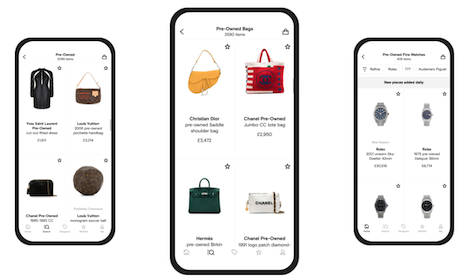 Farfetch launched the second part of a year-long campaign celebrating Black creativity in fashion. Image courtesy of Farfetch
Farfetch launched the second part of a year-long campaign celebrating Black creativity in fashion. Image courtesy of Farfetch
Although the share of luxury ecommerce sales continues to climb, the online shopping experience can still become more elevated.
Speaking at a session at the Vogue Business and Google virtual summit “The Way Forward” on Nov. 11, retail and technology experts discussed how improvements in data capabilities will continue to improve ecommerce. While consumers do not think in channels, bridging the gap between in-store and online experiences is as essential as ever for luxury players.
“One of our key strategic pillars at LVMH is precisely to humanize the digital experience, as oxymoronic as it might sound,” said Michael David, chief omnichannel officer at LVMH Group, Paris.
The conservation was moderated by Laure Guilbault, Paris correspondent at Vogue Business.
The new omnichannel
Service has long been part of luxury’s DNA.
This can be a double-edged sword, however, as the level of service is so high offline that online experiences often fall short for consumers. Meanwhile, sales associates can assist in-store visitors by sharing first-hand about the craftsmanship behind luxury goods all while gaining valuable insights into shoppers.
 LVMH and Google Cloud are joining forces in an effort for personalization and innovation. Image credit: LVMH
LVMH and Google Cloud are joining forces in an effort for personalization and innovation. Image credit: LVMH
“The challenge for us is to figure out a way to translate that into the digital world,” Mr. David said. “It’s definitely a key objective for us: make humans available, easily accessible to our digital clients.”
Among LVMH’s current tactics are online chat and virtual consultations, while enhancing personalization also works alongside service and customer experience. Mr. David cautions, however, that data and artificial intelligence is meant to complement, not replace, people’s emotional intelligence.
Online luxury retailer Farfetch similarly focuses on “the digitalization of the physical experience,” according to Carol Hilsum, senior director of product innovation at the retailer. She cited frustrations around experiencing luxury brands and products through a screen, but this dynamic is starting to change.
Digital features, such as virtual try-ons or switching model experiences, continue to improve and reduce friction points for fashion shoppers.
 Farfetch continues to digitize the luxury shopping experience. Image credit: Farfetch
Farfetch continues to digitize the luxury shopping experience. Image credit: Farfetch
Farfetch is also empowering the smaller boutiques in its marketplace with a new online brand experience. This provides sales associates with information from consumers’ online product discovery, allowing them to better assist in-store shoppers for a true omnichannel experience.
“What new technologies are able to give is this whole new layer of experience, which is as immersive, as multi-sensory and as beautiful as shopping in-store,” Ms. Hilsum said.
Data meets service
As luxury brands and retailers continue to leverage consumer data to enhance the customer experience, many are looking to technology giant Google as a partner.
Instead of rebuilding online platforms from scratch, Google assists partners such as LVMH by incorporating new solutions to evolve the ecommerce experience.
Announced in June, the Google partnership aims to fuel LVMH’s maisons in creating new and personalized consumer experiences that foster long-term growth. It combines both organizations’ creativity, assets, technological capabilities and quest for innovation in their respective markets (see story).
“So from a global perspective, what we’re doing is helping bring that data together, but then we’re also developing individual products that can accelerate the transformation of a brand,” said Carrie Tharp, vice president of retail and consumer at Google Cloud, San Francisco.
This will also prepare brands by making it easier to gleam first-party data, as Google and other technology leaders move away from third-party data amid evolving privacy expectations from consumers and increasing regulatory scrutiny.
As a result, it will be more challenging for marketers to target users and personalize advertising. Google is encouraging brands to build stronger relationships directly with consumers to improve their own first-party data (see story).
“We want to make sure that we provide you know the value that the clients expect,” said LVMH’s Mr. David.
“It is about developing the right content that we will then be able to provide to the right client at the right time on the right channel,” he said. “It is about providing the right level of service that is done well.”